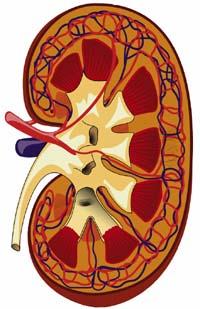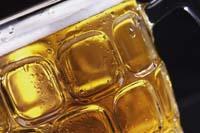Thirst warning
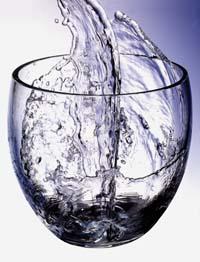
Between 60 and 65% of the human body is water. More than half. The proportion is high, since in this water the physiological functions necessary to live are given. For humans it is essential to maintain this proportion of water so that all its functions are fulfilled correctly.
Some of these functions are related to the maintenance of homeostasis, that is, with the independence of body characteristics such as temperature, concentration of body compounds and the amount of water itself with respect to external variations. If for something the body loses water and does not recover later, it may come to have problems for its proper functioning. To avoid problems, when the water starts to move away from the values of the balance, the alarm signal is lit: we feel thirsty, feeling that the body needs water.
We drink water to quench thirst, but when we drink we do not fill the shortage of water. The water, in the first place, advances in the digestive system until it reaches the intestine, where it is absorbed to pass to the area it needs: the interior environment of the body.
The inner medium is the part in which all body functions are performed. With the digestive system, and as with the respiratory and excretory apparatus, it performs an exchange of unnecessary substances that, in short, are tubes that cross the body, the external environment of the body. The membranes of these tubes are the boundary between the outer and inner environment.
The thirst of the body
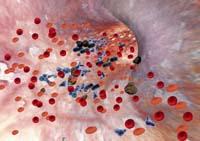
The inner medium distributes water into three compartments: within cells, between cells and within blood vessels. The three compartments are interconnected and there are constant exchanges of water and necessary solutions. Water is the main ease of passage. If a person loses water, the water left in the body is distributed among the three compartments. For this, there are specific channels in cell membranes that allow the exclusive passage of water. They are called aquapescas.
Water moves through osmosis: when the dissolutions located on both sides of a semi-permeable membrane have a different concentration, the solvent passes from a low concentration solution to a high concentration, to equal the concentrations on both sides. In the body, semi-permeable membranes are cell membranes and blood vessels and solvent, water.
Therefore, by losing water, due to osmosis, the whole body perceives that lack of water, even the center that controls the body's need for water, the hypothalamus. To know the state of the body's water, the hypothalamus measures blood vessel pressure and blood concentration in the blood vessels that reach the hypothalamus. When you lose water, blood vessel pressure is lower, as blood volume decreases and blood is more concentrated. When the hypothalamus detects lack of water, it begins to ask for water: it makes you feel thirsty.
Water loss for waste disposal
In addition to water, the body needs other ingredients like food for energy. When cells break down food, along with obtaining energy, they produce highly toxic compounds as waste. The elimination of these compounds from the body is essential for the proper functioning of the cells. As these wastes are soluble in water, the body uses this water to eliminate it.
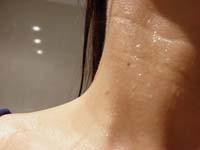
Expulsion occurs in the kidneys. As mentioned above, once the membrane of the kidneys is crossed, water and waste pass to the excretory apparatus, therefore to the external environment. The kidneys are responsible for the disposal of waste and keeping the volume of water in the interior environment in balance. To meet this goal they have a great ability to concentrate or dilute urine based on body water level.
However, this capacity has a limit, and in the harshest conditions, for example, although a person who does not have water is sweating and drowning thirst, the kidneys produce urine, even if it is to the detriment of the water balance. The cells, in the performance of their activity, continuously generate waste that must be removed by urine. Under the conditions of the example, the kidneys will do their best to concentrate the urine, that is, to remove as many waste as possible in as little water as possible, but they will always remove the water. The body stops with less water, so the alarm signal is turned on: thirst.
Water loss to regulate temperature
Another way to lose body water is sweating. Sweat is used to dissipate body heat. If a person is at high temperature or does some physical activity, the body tissues are heated. As with the volume of water, it is essential for the body to maintain the body temperature in certain values. The body has temperature receptors in the skin and inside the body. When an increase in body temperature is detected, the body begins to sweat to return it to the usual values.
Sweat is largely water. The blood vessels transport water to the skin, which by evaporation dissipates the heat produced by the body. This allows man to regulate body temperature. Thus, the higher the body heat, the more water loses by sweat. When there is not enough water to properly perform the functions of the body, the alarm goes on: you feel thirsty.
Risk of thirst
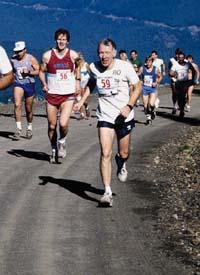
Therefore, we know that with thirst our body warns us of lack of water. And if we do not drink, what? The body will have less and less water and, from a certain level, water shortage will cause damage. This damage is called dehydration.
On the one hand, the loss of water from cells causes intracellular compounds to accumulate, to be more concentrated. In this situation there may be problems to fulfill the functions of the cells, since the compounds will not have the necessary structure for their proper functioning. On the other hand, the volume of blood in the blood vessels is reduced. This affects the whole body, since having less blood, the blood cannot reach all parts of the body. Consequently, it may not carry oxygen or food to all parties or expel waste generated therein. In order to compensate for blood shortage, it increases the frequency of heartbeat, decreasing blood circulation in the body but increasing speed. In this situation, the person feels fatigue.
Another consequence of blood scarcity is the existence of heat dissipation problems, since the priority of blood collection is because blood cannot reach the skin. Therefore, in a state of dehydration, heat will accumulate in the body without dissipation.
If the body cannot keep its temperature in balance, it will suffer damage. The person in this situation suffers a hyperthermia, being the most common to suffer a heat stroke. Its symptoms are usually sudden fatigue, nausea or headache; if it is more severe it may have problems coordinating movements or even delusions, arriving in the most serious cases to lose consciousness.
Solution to thirst
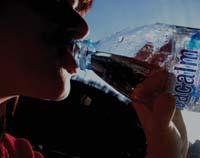
All these problems have a simple solution: drinking. Thirst calms at the time of drinking; little by little water is absorbed into the intestine and introduced into the interior environment of the body, which allows to recover the concentration of the interior environment of the body in balance.
Now comes the usual question: what is the amount to drink a day? For what the body demands, neither more nor less. Today it is fashionable to drink lots of water, thinking that it is beneficial for health, that cleanses the body and relying on more topics like this. And that is not true. In fact, a healthy person, without problems in the kidneys, heart and hypothalamus, is enough to drink as you feel thirst to satisfy the need for water of the day.
If someone, without feeling need, drinks water, it will be absorbed by the body, will go to the kidneys and will come out as it has entered, from which the body will not benefit. What's more, drinking too much can harm the body. It has already been mentioned above that the kidneys have a limit of urine concentration. As well as dilute urine. If we drink too much water, when eliminated other compounds will be eliminated along with water, which can cause a loss of the concentration of the interior environment of the body in equilibrium conditions, a greater dilution. This will cause other problems.
